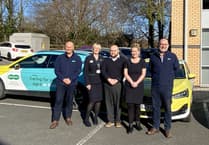- 68% of teachers in the South West identified breaking down stereotypes as the main benefit of careers education in primary schools
- 44% of local businesses are concerned that ‘lost learning’ from the pandemic will exacerbate the skills shortage amongst pupils and students
- Two thirds (66%) of local teachers agreed that improved careers education would decrease the number of NEET (not in education, employment, or training) young people
New polling* has today highlighted significant concern amongst teachers and businesses about how prepared young people are for the world of work – particularly following the Covid-19 pandemic.
The polling is released by education charity Teach First as they launch a new report, Careers Education: Investing in Our Country’s Future. The report makes a series of recommendations on how improving careers education – and increasing business engagement with schools – can help level up opportunities for young people from disadvantaged backgrounds.
The data reveals that almost 8 in 10 teachers (77%) in South West schools said their pupils are less ready for the world of work when compared to previous cohorts, while nearly half (45%) believe the pandemic has left their pupils feeling less optimistic about their career prospects.
Teach First also conducted a survey of over 500 HR decision makers from British businesses and found they share this concern, with 44% of South West businesses saying they are concerned that ‘lost learning’ from the pandemic will exacerbate the skills shortage amongst pupils and students.
While grades are hugely important, the research suggests that other skills are also highly valued by employers. When asked to select the top three skills that they would consider most if recruiting young people, they were most likely to choose broader soft skills – e.g. communicating, presenting, problem-solving, etc. (77%), literacy and numeracy (60%), and digital and IT skills (56%). However, when asked to give their assessment of the preparedness of current school, college and university leavers, 77% of local businesses said that they were concerned about their level of soft skills. They also reported concerns about the level of literacy and numeracy (72%) and digital and IT skills (51%).
In their new report Teach First argues in favour of a series of recommendations which they believe could make a tangible impact on young people’s employability. Two thirds (66%) of local teachers agreed that improved careers education would decrease the number of young people that end up classified as Not in Education, Employment or Training (NEET).
Children on free school meals are currently twice as likely to be NEET at age 18-24 compared to those not (26% compared to 13%)[i].
Solutions
To help tackle this, Teach First believe careers education needs to start at primary school level. Teachers agree, with over 6 in 10 (62%) primary schools teachers in the South West believing career-related learning for their pupils will raise aspiration, and more than 7 in 10 (73%) said it will raise their pupils’ awareness of different career pathways.
The DfE recently made a welcome commitment for a new careers programme for primary schools in disadvantaged areas in the recent Schools White Paper. In order to be as effective as possible, Teach First wants the DfE to work with sector leaders and publish a framework for effective careers learning in primary schools based on the Gatsby benchmarks and pair this with a new fund that trains and supports primary teachers working in disadvantaged areas.
Based on their own experience of successfully training Career Leaders in secondary schools, Teach First estimate this would cost £8.5m to support the top 10% most disadvantaged primary schools by pupils’ free school meal eligibility – which is approximately 2,000 primary schools.
The report also calls for a series of other key recommendations, including:
- Large employers to offer blended work experience programmes for young people from disadvantaged backgrounds. Whilst in-person work experience will continue to be crucial, online options offer employers a chance to diversify their recruitment and widen participation – particularly to regions outside of London.
- Large employers should collect and publish socioeconomic background data to inform their outreach work with schools and recruitment policies. This will ensure disadvantaged pupils, who are far less likely to access work placements through their family networks, are helped to secure the same opportunities to vital careers knowledge and experience.
- The Department for Education should use destinations data to target additional transitional support at schools and colleges that serve disadvantaged communities
Russell Hobby, CEO of Teach First, said:
“Our country’s long-term prosperity depends on the next generation of young people. Careers education is an essential part of that – making a significant impact on a young person’s development at school, as well as their future employment opportunities. Schools do their best to prepare pupils for the world of work, but that is not their core purpose. That is why we believe it is essential that employers are involved in shaping the future of careers education.
“For too long, securing high quality careers advice and work experience has been a postcode lottery – that must change. With concerns over the cost-of-living crisis, and a potential recession later in the year, it’s vital that we do everything we can to give our young people the best possible chance to succeed and thrive in the world of work”.
Isabella Tapping, a Year 12 pupil from The Bourne Academy, a Teach First partner school based in Bournemouth, took part in a Goldman Sachs careers residential. She said:
“Along with nine other students from my school, I was chosen for the Goldman Sachs Careers Residential due to choosing mostly STEM based subjects for my GCSEs and A-Levels. I was honestly quite shocked to be chosen to attend as I never usual get picked for trips like this, but was very excited, and hoped to understand how the financial sector works.
“When I think about my future career I feel a mix of emotions. It’s hard to know what you want to do at my age, but I really like physics and hope to pursue a PhD in Astrophysics. While that’s a little terrifying, I’m optimistic and excited to be able to achieve what I want to do. My Physics teacher tries his hardest to support me, his extra lessons after school have really helped me and other students improve.
“Alongside helping me develop useful skills for any career, the experience has really opened my eyes to different sectors and helped me to understand how things like crypto currency work. It’s been really interesting!”
“Opportunities like this are so important to young people like me because they can really help us to understand what we might want to do with our lives. While I’m still set on perusing a career in Astrophysics, it’s really nice to know that there are so many other options out there, in case that career doesn’t work out.”




